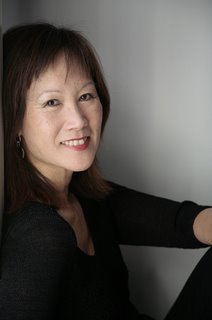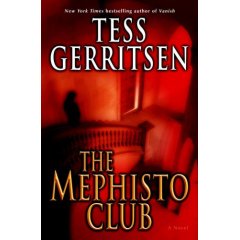 Tess Gerritsen is a Phi Beta Kappa graduate of Stanford University. Tess went on to medical school at the University of California, San Francisco, and was awarded her M.D. in 1979. After completing her internal medicine residency, she worked as a physician in Honolulu, Hawaii. In 1987, Tess's first novel was published. CALL AFTER MIDNIGHT, a romantic thriller, was soon followed by eight more romantic suspense novels. She also wrote a screenplay, "Adrift," which aired as a 1993 CBS Movie of the Week starring Kate Jackson. Her thriller, Harvest was released in 1996, and marked Tess's debut on the NEW YORK TIMES bestseller list. Film rights were sold to Paramount/Dreamworks, and the book was translated into twenty foreign languages. Now retired from medicine, Tess writes full time and lives in Maine.
Tess Gerritsen is a Phi Beta Kappa graduate of Stanford University. Tess went on to medical school at the University of California, San Francisco, and was awarded her M.D. in 1979. After completing her internal medicine residency, she worked as a physician in Honolulu, Hawaii. In 1987, Tess's first novel was published. CALL AFTER MIDNIGHT, a romantic thriller, was soon followed by eight more romantic suspense novels. She also wrote a screenplay, "Adrift," which aired as a 1993 CBS Movie of the Week starring Kate Jackson. Her thriller, Harvest was released in 1996, and marked Tess's debut on the NEW YORK TIMES bestseller list. Film rights were sold to Paramount/Dreamworks, and the book was translated into twenty foreign languages. Now retired from medicine, Tess writes full time and lives in Maine.
What book or project is coming out or has come out that you’d like to tell us about?
 THE MEPHISTO CLUB will be published on September 12. It’s the sixth in the Jane Rizzoli crime thriller series. When ancient symbols and Latin phrases are found scrawled on the wall at a Christmas Eve murder scene, Jane follows a trail of Biblical clues to track down a killer who may be one of the Nephilim – a descendant of a “fallen angel” from the Old Testament.
THE MEPHISTO CLUB will be published on September 12. It’s the sixth in the Jane Rizzoli crime thriller series. When ancient symbols and Latin phrases are found scrawled on the wall at a Christmas Eve murder scene, Jane follows a trail of Biblical clues to track down a killer who may be one of the Nephilim – a descendant of a “fallen angel” from the Old Testament.Tell us about your journey to publication. How long had you been writing before you got the call you had a contract, how you heard and what went through your head.
I had written three unpublished manuscripts before I sold my first novel to Harlequin Intrigue books. I had just landed a literary agent who – and I still find this astonishing after all these years – mailed me a LETTER to tell me that my first book was sold.
So when I got a call from a Harlequin editor asking me to fill out a “cover art” worksheet, I was still in the dark that I had sold my book. After a few minutes of an “Alice-in-Wonderland” conversation, it finally dawned on me that Harlequin had bought CALL AFTER MIDNIGHT. The details are a little hazy to me, but I think I was quite calm about it. After I hung up the phone, I went for a long walk. I didn’t really have anyone to call – I knew so few writers – so for the rest of the day, I just went about in a euphoric daze, thinking: “I’m going to be published! I’m going to be published!”
Do you still experience self-doubts regarding your work?
With every single book. I’m working on my twentieth now, and I still wake up at night, in a sweat, wondering if I’ll be able to make this one work. I think that self-doubt is what makes us always strive to write better stories. Once we become self-satisfied, the work surely suffers.
What mistakes have you made while seeking publication?
I didn’t realize what a really GOOD agent can do for you. I was satisfied with my first agent for far too long – heck, I was just happy to have any agent! He offered no guidance, no career planning. He never recognized that I had what it took to move beyond category romance, and he was satisfied to just forward manuscripts to the editor and collect his commission.
Only after I discovered that he’d been withholding royalties from me did I finally understand I needed to move on. I should have remembered that he was working for ME – not vice versa.
What’s the best advice you’ve heard on writing/publication?
When you’ve turned in your book, get right to work on the next one. So much of a writer’s success depends on writing quickly and consistently. I’ve seen too many writers sell their first book, only to disappear from the publishing scene entirely, because they never sold their second book. Maybe they got blocked, or they took too much time finishing the next project. You are so easily forgotten in this business, and if more than three years have passed since your first book was published, you might as well be back to being a debut author.
What’s the worst piece of writing advice you’ve heard?
“Don’t start writing until you’ve got your book completely outlined.” Now, that may work for other writers, but for me, that’s terrible advice. My own technique involves feeling my way through the story, discovering shocking plot twists, and getting to know my characters along the way. If I outline, then I don’t allow myself to go down the unexpected alley, where sometimes the most surprising things happen. Every writer needs to find the technique that works for her – and it may be something entirely different from what other writers do.
Is there a particularly difficult set back that you’ve gone through in your writing career you are willing to share?
My book GRAVITY did not sell well. It was my fourth medical thriller, and my favorite of all my books, but its sales were so disappointing that I realized my career could very well be starting its “death spiral”, when bookstores order fewer copies, leading to fewer sales, leading to even fewer orders.
Demoralized, I took a year off to re-group, and to think about what I should write next. Certainly not a technical thriller like GRAVITY – I’d discovered that women just didn’t like that sort of book, and if you don’t have your women readers, you’re sunk. So I took my time and wrote, on spec and without a contract, THE SURGEON. Unlike my earlier four books, it was not a medical thriller but a crime thriller.
To my surprise, it re-energized my sales, and started me back on my bestseller track. That experience taught me that, to survive in this business, a writer sometimes has to remake herself.
What are a few of your favorite books? (Not written by you.)
Philippa Gregory’s THE VIRGIN’S LOVER, Rosamunde Pilcher’s THE SHELL SEEKERS, Larry McMurtry’s LONESOME DOVE. My reading tastes go all over the place!
What piece of writing have you done that you’re particularly proud of and why?
As I mentioned earlier, I’m most proud of my thriller GRAVITY, which is about NASA and the space program. Not only did it incorporate my own love of science and medicine, it also forced me to tackle something entirely new – the techno-thriller. Of all my books, it seems to be the one that my male readers love the most.
Do you have a pet peeve having to do with this biz?
Yes. How little respect is given to genre fiction. Most book reviewers focus only on literary fiction, and they seem to regard crime writers and romance writers and science fiction writers as if we’re the unwashed masses.
Can you give us a view into a typical day of your writing life?
I try to write about four pages a day, and I start around mid-morning and just keep working until either I’ve reached my quota, or it’s time to eat supper! I write the old fashioned way, using pen and paper for my first drafts. Only when I get to my second draft do I start using the computer. But I’m easily distracted, and in the course of my workday, I’ll stop to check out my vegetable garden, or play my fiddle, or answer email.
If you could choose to have one strength of another writer, what would it be and from whom?
I’d love to have Stephen King’s ability to write utterly believable characters. And his completely focused work habits!
Do you have a dream for the future of your writing, something you would love to accomplish?
I’m working on it now; I’m writing an historical thriller about medicine in the 1830’s. It’s a brand new challenge for me, and I’m loving every minute of it! (In between the moments of hating it!)
Was there ever a time in your writing career you thought of quitting?
Every time I get a lousy review! Even now, I get terribly discouraged when one of my books gets slammed. I wonder why anyone would want to put themselves out there for public humiliation by book critics. I wonder if maybe the critics are right, that I’m a no-talent nothing. I begin to think that maybe I should just retire and become an archaeologist instead. But then a new story idea hits me, and I remember that, yes, I’m a writer.
What is your favorite and least favorite part of being a writer?
My favorite part: being paid to explore subjects that fascinate me. My least favorite part: having to worry about whether my books are selling.
How much marketing do you do? Any advice in this area?
Luckily, I’m now in the position where my publisher does most of my marketing. But I still do a number of things myself. I maintain a website. I print up bookmarks so I have something to give away when I do signings. I speak at libraries and bookstores. And for MEPHISTO CLUB, I hired my own publicist.
Parting words?
Storytellers are born, not made.























I appreceiate your remarks about book critics focusing on literary fiction and ignoring genre fiction. I agree and happen to prefer genre fiction myself. Thanks for sharing with us.
ReplyDeleteGreat interview Gina and Tess.
ReplyDeleteThis book is a definite buy on Sept 12th...that's my kind of story.
Tess that was a great last line to the interview. I'm putting you up on my author quotes with that one!
Thanks Tess! I appreciate you sharing your story. I'd like to check out that technothriller. Congratulations on your fantastic success.
ReplyDeleteInteresting interview. I can so relate to the worry of how things are selling. It would be lovely to just write and not have to worry about the rest!
ReplyDeleteGreat interview. I've been a fan of Tess' for a long time, beginning with Harvest.
ReplyDeleteTess, I wish you continued success.
Tess, I love your idea with the Nephilim. I'll have to check out the book. Thanks for your interview and the inspiring story of avoiding the "death spiral." My third novel comes out in two weeks, and I've been facing similiar issues/questions. You've encouraged me to press on.
ReplyDelete